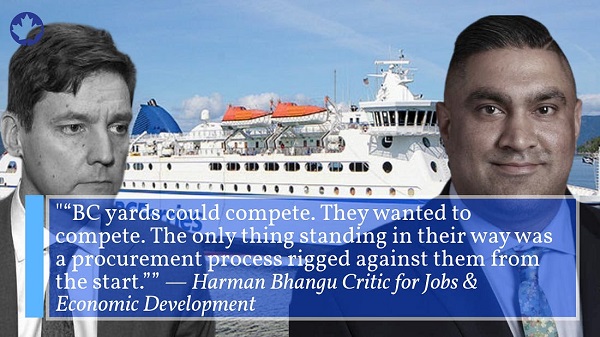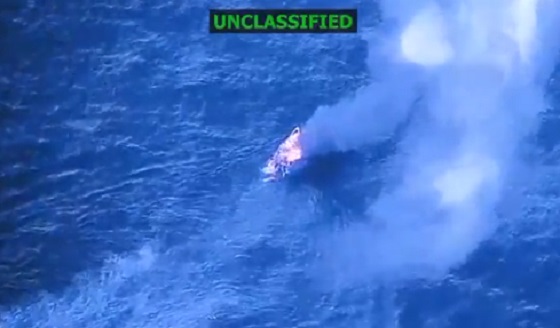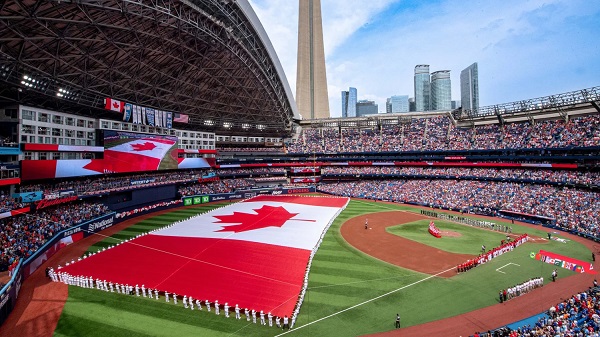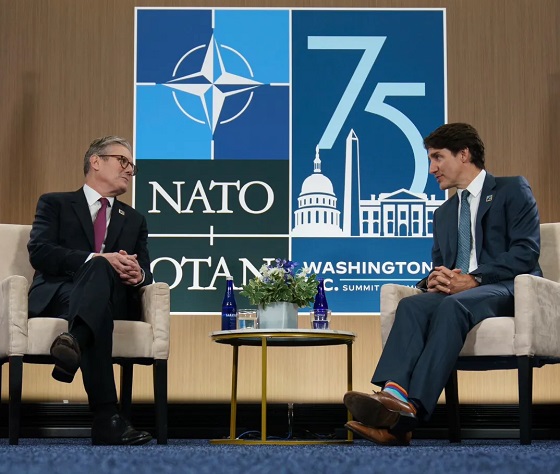Business
Poilievre Slams Carney’s Tariff Retreat

After promising to stand up to Trump, Carney folded after a phone call. Poilievre says the Prime Minister made “a very generous concession” without securing a single written commitment.
So after months of bragging that he was the only man in Canada tough enough to “handle Trump,” Mark Carney finally had his big moment. A phone call. That’s it. Not a summit. Not a negotiation. A phone call. And after that one conversation, he walked out to the cameras today and proudly announced that Canada is dropping its retaliatory tariffs on U.S. goods — no conditions, no written deal, not even a signed cocktail napkin.
And we’re supposed to clap.
Pierre Poilievre didn’t. He called it what it is: “a very generous concession by the Prime Minister without a single written commitment in exchange.” That’s not strength. That’s surrender. And it’s not even new. Poilievre laid it out clearly, Carney’s backed down on everything since taking office: dollar-for-dollar retaliation? Gone. Military spending? Backed down. Digital services tax? Watered down. And now, trade? Gutted.
And yet, Carney stands there pretending this is a win. Why? Because the Americans gave Canada the carve-out they gave everyone else. Meanwhile, Trump’s tariffs on Canadian steel and aluminum are now 50 percent. Our tariffs? Still half that. Asked if he’ll match them, Carney said no. But yes — we’re supposed to believe he’s standing tall.
Here’s what Poilievre actually said: “American tariffs are now twice as high on Canada as they were when Carney took office.” That’s what this so-called strategy has delivered. Twice the pain. Zero gain.
And that line Carney keeps using that Canada has “the best deal in the world”? Poilievre shut it down. “That’s Brian Mulroney’s deal,” he said. Every tariff-free good going across the border today is because of NAFTA and the original Free Trade Agreement not Mark Carney. Carney didn’t negotiate one new tariff-free item. Not one. But he’s sure good at taking credit.
And here’s the real kicker. When asked what he would have done differently, Poilievre didn’t hedge. “I would have negotiated from strength,” he said. “You drop your tariffs, we drop ours.” That’s how normal countries operate. That’s how you protect your own workers. Instead, we’ve got a Prime Minister who flinches every time the U.S. blinks and then tells you it was a masterstroke.
But it gets worse. Trump’s hammering us with tariffs, and Carney is hammering our own industries with a carbon tax. This is Poilievre again: “Our workers are hit with Trump’s tariffs and Carney’s carbon tax.” That’s real. You know who doesn’t put a carbon tax on steel? Donald Trump. So now our factories are fighting a war on two fronts and one of them is being waged by their own government.
And what’s Carney building? Nothing. Literally nothing. “He hasn’t approved a single pipeline, nuclear, hydro, or LNG project,” Poilievre said. “Not one.” Instead, he’s created a new construction office which, in case you’re wondering, doesn’t build anything. It just talks about maybe building something. Some day. Possibly.
Carney also promised to double homebuilding. What’s actually happening? “CMHC projects it will drop by 13 percent,” Poilievre said. So that’s another promise, shattered on impact.
According to Poilievre, Carney didn’t just fail to deliver he made it worse. He said he’d “spend less and invest more.” In reality? “Spending is up eight percent, the deficit will double, and investment is down $60 billion — the biggest capital outflow in five months in Canadian history,” Poilievre said. So congratulations — you’ve now got less money, less investment, and a bigger hole.
And if you thought immigration enforcement was going well… no. Poilievre revealed the government lost track of 600 non-citizen criminals who were supposed to be deported. They’re still out there, somewhere, courtesy of Mark Carney.
And when asked about the case in Lindsay, Ontario a man being prosecuted for defending his home. Poilievre said what every sane person believes: “If someone breaks into your house, you have the right to stop them. If you don’t want to be harmed, don’t invade someone’s home.” Simple. Clear. Decent. Everything this government isn’t.
And Carney? The man who promised “elbows up”? Poilievre said it best: “He hasn’t thrown one elbow since he took office, except at Canadian workers.”
So what now? Poilievre actually offered him a way out. He said he’d support the Canadian Sovereignty Act, legislation already written, that would make Canada the fastest place in the world to get a pipeline built. He even told Carney, “Take the credit. I don’t care. Let’s get it done.”
That’s what leadership sounds like. But instead, we’ve got Mark Carney. A guy who hired a $6,000 PR firm to tell him how to talk to Donald Trump, then gave away Canada’s leverage after a single phone call and called it a win.
He didn’t throw an elbow. He dropped to his knees and judging by the grin on Trump’s face, he didn’t stop there.
Subscribe to The Opposition with Dan Knight .
For the full experience, upgrade your subscription.
Business
The Grocery Greed Myth

Haultain’s Substack is a reader-supported publication.
To receive new posts and support our work, please consider becoming a free or paid subscriber.
Try it out.
The Justin Trudeau and Jagmeet Singh charges of “greedflation” collapses under scrutiny.
“It’s not okay that our biggest grocery stores are making record profits while Canadians are struggling to put food on the table.” —PM Justin Trudeau, September 13, 2023.
A couple of days after the above statement, the then-prime minister and his government continued a campaign to blame rising food prices on grocery retailers.
The line Justin Trudeau delivered in September 2023, triggered a week of political theatre. It also handed his innovation minister, François-Philippe Champagne, a ready-made role: defender of the common shopper against supposed corporate greed. The grocery price problem would be fixed by Thanksgiving that year. That was two years ago. Remember the promise?
But as Ian Madsen of the Frontier Centre for Public Policy has shown, the numbers tell a different story. Canada’s major grocers have not been posting “record profits.” They have been inching forward in a highly competitive, capital-intensive sector. Madsen’s analysis of industry profit margins shows this clearly.
Take Loblaw. Its EBITDA margin (earnings before interest, taxes, depreciation, and amortization) averaged 11.2 per cent over the three years ending 2024. That is up slightly from 10 per cent pre-COVID. Empire grew from 3.9 to 7.6 per cent. Metro went from 7.6 to 9.6. These are steady trends, not windfalls. As Madsen rightly points out, margins like these often reflect consolidation, automation, and long-term investment.
Meanwhile, inflation tells its own story. From March 2020 to March 2024, Canada’s money supply rose by 36 per cent. Consumer prices climbed about 20 per cent in the same window. That disparity suggests grocers helped absorb inflationary pressure rather than drive it. The Justin Trudeau and Jagmeet Singh charges of “greedflation” collapses under scrutiny.
Yet Ottawa pressed ahead with its chosen solution: the Grocery Code of Conduct. It was crafted in the wake of pandemic disruptions and billed as a tool for fairness. In practice, it is a voluntary framework with no enforcement and no teeth. The dispute resolution process will not function until 2026. Key terms remain undefined. Suppliers are told they can expect “reasonable substantiation” for sudden changes in demand. They are not told what that means. But food inflation remains.
This ambiguity helps no one. Large suppliers will continue to settle matters privately. Small ones, facing the threat of lost shelf space, may feel forced to absorb losses quietly. As Madsen observes, the Code is unlikely to change much for those it claims to protect.
What it does serve is a narrative. It lets the government appear responsive while avoiding accountability. It shifts attention away from the structural causes of price increases: central bank expansion, regulatory overload, and federal spending. Instead of owning the crisis, the state points to a scapegoat.
This method is not new. The Trudeau government, of which Carney’s is a continuation, has always shown a tendency to favour symbolism over substance. Its approach to identity politics follows the same pattern. Policies are announced with fanfare, dissent is painted as bigotry, and inconvenient facts are set aside.
The Grocery Code fits this model. It is not a policy grounded in need or economic logic. It is a ritual. It gives the illusion of action. It casts grocers as villains. It gives the impression to the uncaring public that the government is “providing solutions,” and that “it has their backs.” It flatters the state.
Madsen’s work cuts through that illusion. It reminds us that grocery margins are modest, inflation was monetary, and the public is being sold a story.
Canadians deserve better than fables, but they keep voting for the same folks. They don’t think to think that they deserve a government that governs within its limits; a government that accept its role in the crises it helped cause, and restores the conditions for genuine economic freedom. The Grocery Code is not a step in that direction. It was always a distraction, wrapped in a moral pose.
And like most moral poses in Ottawa, it leaves the facts behind.
Haultain’s Substack is a reader-supported publication.
To receive new posts and support our work, please consider becoming a free or paid subscriber.
Try it out.
Business
Tax filing announcement shows consultation was a sham

The Canadian Taxpayers Federation is criticizing Prime Minister Mark Carney for announcing that the government is expanding automatic tax filing within hours of the government’s consultation ending.
“There’s no way government bureaucrats pulled an all-nighter reading through thousands of submissions and survey responses before sending Carney out to make an announcement on automatic tax filing the next morning,” said Franco Terrazzano, CTF Federal Director. “Asking Canadians for their opinion and then ignoring them isn’t a good look for Carney, it makes it look like the government is holding sham consultations.”
The government of Canada announced consultations on automatic tax filing so Canadians could give the government “broad input through an online questionnaire.”
The government’s consultation ended on Thursday, Oct. 9, 2025.
Hours after the consultation ended, Carney today announced the government would expand automatic tax filing.
The CRA is already one of the largest arms of the federal government with 52,499 bureaucrats.
The CRA added 13,015 employees since 2016 – a 33 per cent increase. For comparison, America’s Internal Revenue Service has 90,516 bureaucrats. The CRA has one bureaucrat for every 800 Canadians. The IRS has one bureaucrat for every 3,800 Americans.
“The CRA can barely answer the phone, so Carney shouldn’t be giving those bureaucrats more busy work to do,” Terrazzano said. “The CRA is a bloated mess, and Carney should be cutting the cost of bureaucracy not scheming up ways to give the bureaucracy more power over taxpayers.”
The CRA only answered about 36 per cent of the 53.5 million calls it received between March 2016 and March 2017, according to a 2017 Auditor General report. When Canadians were able to get the CRA on the phone, call centre agents gave inaccurate information about 30 per cent of the time.
“The CRA acting as both tax collector and tax filer is a serious conflict of interest,” Terrazzano said. “Trusting the taxman to do your tax return is like trusting your dog to protect your burger.
“Carney should stop the CRA power grab and instead cut taxes and simplify the tax code.”
-

 Alberta1 day ago
Alberta1 day agoFact, fiction, and the pipeline that’s paying Canada’s rent
-

 International1 day ago
International1 day agoIsraeli government approves Gaza ceasefire
-

 Crime1 day ago
Crime1 day agoFlorida teens credited for averting school shooting plot in Washington state
-

 Alberta1 day ago
Alberta1 day agoAlberta Is Where Canadians Go When They Want To Build A Better Life
-

 International1 day ago
International1 day agoTrump-brokered Gaza peace agreement enters first phase
-

 Internet2 days ago
Internet2 days agoSocial media pushes pornography on children within minutes, report finds
-

 Energy1 day ago
Energy1 day ago“It is intellectually dishonest not to acknowledge the … erosion of trust among global customers in Canada’s ability to deliver another oil pipeline.”
-
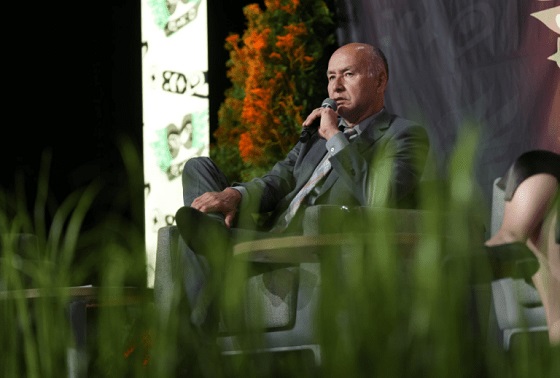
 Energy1 day ago
Energy1 day agoIn the halls of Parliament, Ellis Ross may be the most high-profile advocate of Indigenous-led development in Canada.








